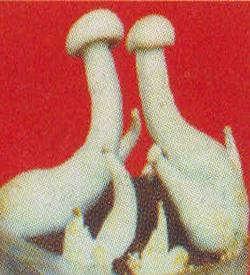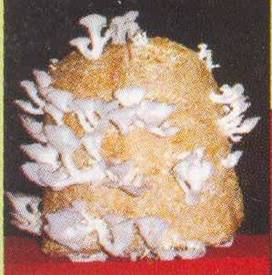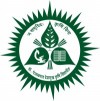About Department
The Department has been established in April, 1970, with the main objective of teaching, research and extension in the subject of plant pathology and carry out need based research as per need of the region Three hundred fifty and twenty seven students of M.Sc (Ag.) and Ph.D respectively secured the degree from this department. More than 500 research articles published in National and International Journals. This department has qualified faculty. Most of the staff members are having Doctorate degree from reputed institutions in the country.
Research work on grey mildew of cotton, ergot of sorghum, grain mold of sorghum, management of Betelvine diseases and management of Phytophthora in citrus with integrated approach have been recognized at national and international level.
Implementation of ICAR Syllabus recommended by the National Core Group from the academic year 2009 -10.
Department is also engaged in commercial production of biocontrol agents, biofertilizers, quick decomposing culture and mushroom spawn.
The department has the biopesticide production and testing lab.
Academic Programmes
Student intake/year: –
M.Sc.- 21
Ph.D.- 03
Pertaining to teaching 297 M.Sc.(AG) and28 Ph.D students completed the degree.
No. of credit for M.Sc. and Ph.D to be completed- 55
Infrastructure Facilities
The Department has two class room-2, three laboratories and has number of sophisticated instrument like Laminar Air Flow, Deep Fridge, Centrifuge, Nitrogen estimator, Electronic Balance, Plant Growth Chamber, PCR Machine, Gel Electrophoresis Unit, and Lyophilizer etc.
Mandate
- Education
- Research
- Extension
Research Activities/Achievements
Major Research theme were approved as per ARC and work carried on major problems on Phytophthora of Citrus, Indexing root stalk staining, Grey mildew of cotton .Research work on various problems on Pulses ,Oilseeds, Sorghum, Soybean, Wheat, Sugarcane, Linseed and Sesame etc. is being carried out at their relative research station. Department has developed a technology for decomposition of Agriculture waste within 90 days. PEQ for DIA Ministry of Agril and Co-op and NHM Govt. of Maharashtra has funded Rs. 1.25 crore for establishment in the year 2006 . This year sanction for two new projects has been granted. The project entitled “Management of red leaf and grey mildew of cotton” of Rs.15 lakhs approved by Directorate of Cotton development, Ministry of Agril. Government of India funded under technology mission in cotton mini mission-GMC-MMI through a network on national information system and pest management and coordinated by NCIPM New Delhi and establishment of plant health clinic of Rs 20.00 lakhs funded by NHM, New Delhi. Betelvine research station is under the head of Department of Plant Pathology. Department is also organizing two winter school on the topic “Advances in production and delivery system of biopesticides, bioagents and biofertilizers.” and “Plant quarantine and pest risk analysis”. for the duration of 21 and 10 days each.
Extension Activities and Achievements
Department is carrying following extension activities every year. Clinical pathology under which the disease specimens are examined, diagnosed and appropriate control measures are suggested. Faculties are also delivering technical information through Akashwani, Doordarshan and in the form of popular articles. Field visits are also performed whenever serious problem or disease epidemics are observed. There are number of publications some important publications are
Publication
- Mushroom Cultivation Technology (Marathi)
- Cotton diseases and their control (Marathi)
- Soybean diseases and their control (Marathi)
- Betelvine diseases and their control (Marathi)
- Status report on Biocontrol agents (Marathi)
- Management of Phytophthora in citrus nursery (Marathi)
In addition to this department is running a scientific journal which is gaining popularity amongst scientific from different part of countries. Faculties have received award in national Symposium.
Research Recommendations (Approved in AGRESCO)
Department has made more than 160 recommendations on the basis of experiments for the benefits of the cultivations, some notable are
|
1.
|
Plant protection schedule for control of sooty mould and Phytophthora in citrus with integrated approach |
|
2.
|
Status of ergot and grain mold of sorghum |
|
3.
|
Schedule for control of leaf curl and dieback of chilli |
|
4.
|
Integrated management of Betelvine wilt |
|
5.
|
Control of powdery mildew of mung, udid, pea, mango, ber and roses. |
|
6.
|
Experiments for solution to the various emergent aspects are carried out every on the basis of feedback and mandate of the co-ordinate projects. |
|
7.
|
Two species of oyster mushroom Pleurotus sajorcaju and P. floroda are recommended for cultivation in Vidarbha |
|
8.
|
Developed cylinder method for oyster mushroom production |
|
9.
|
Management of soil borne diseases by use of different antagonists |
|
10.
|
Management of Phytophthora root rot in citrus |
|
11.
|
Bio-efficiency, standardization, formulations of insect pathogen i.e. Metarrhizium, Beauveria, Nomuraea, Verticillium as compared to um is being made. Local isolate were proved to be highly efficient in management of insect, pest. |
|
12.
|
Bacillus thuringiensis vidarbha isolate 5AM and 5I were found to be more toxic possessing LC-50 of 206.07 and 324.03 ug/ml are highly effective against H. armigeraas compared to international standards |
|
13.
|
Centrally sponsored Mushroom development scheme: Centrally sponsored mushroom spawn production unit, Centrally sponsored pasteurized compost unit, Mushroom Processing and Recipes development |
|
14.
|
Besides above agency schemes training for farmers on mushroom cultivation is regularly organized by this department every month. Plant pathologists are regularly involved in training programmes in integrated disease management. Testing of chemicals, botanicals and bio-agents for disease management, screening of elite lines and breeding materials for various diseases and are involved in breeding for disease resistance. |
|
15.
|
Screening of efficient strains and studies on cheaper substrates for mass production are initiated for Trichoderma, Metarrhizium, Beauveria, Nomuraea and Verticillium etc, and on the basis of these studies, identified the cost effective sources. |
|
16.
|
Valid conclusion was made in regard to bio-control of Phytophthora by use of Trichoderma as an eco-friendly and cheaper measure. This department is supplying the basic cultures of these bio-agent to entrepreneurs and State Govt. laboratories. Visits to cultivators field for counseling. Refresher courses for extension workers and master trainers. Department has Plant health clinic for diagnosis and advise for appropriate control measures. Regular messages about the management of crop diseases are published through Agro- Advisory bulletin, Akashwani, Doordarshan, Newspapers. As well the fore warnings with package of practices are sent to state department for taking up precautionary measures. |
 |
 |
 |
Publications
List of Books/ Folders/ Leaflets

Contact Information
Dr. S. S. Mane
Professor & Head Plant Pathology,
Dr. Panjabrao Deshmukh Krishi Vidyapeeth, Akola
hdppathology@pdkv.ac.in

